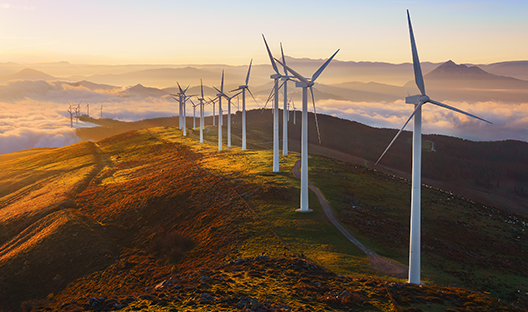Get Focus insights straight to your inbox
2020 was the hottest year recorded over a 141-year period, with Northern Hemisphere land and ocean surface temperatures rising +1.28°C (+2.30°F) above average. Climate change has become a prolific topic, consuming many news headlines and inspiring mass movements across the globe. Action has been motivated across all age groups from prominent figures including Greta Thunberg through her ‘Mass school strike for climate’, and David Attenborough through his Witness Statement documentary.
The effects of climate change are becoming consistently visible, more detrimental, and harder to ignore with each passing year. The problem is that we think we have more time than we do. While the coronavirus caused the world to shut down and gave our natural environment momentary relief in 2020, it is evident that if real change does not take place systemically and as a matter of urgency, we are on a collision course towards irreversible damage. The time for action is now.
Climate Action, or goal 13, is one of the 17 Sustainable Development Goals (SDGs), otherwise referred to as the “global goals for sustainable development”. The objective of SDG 13 is to take urgent action to combat climate change and its related impacts.
What exactly is climate change?
Climate change is caused by human activity which produces CO2 emissions and other greenhouse gasses. These emissions result in globally increased average surface temperatures and have the potential to adversely affect every ecosystem. The increased emissions and resultant climate change often manifests through extreme weather events (such as extreme cold in Texas, wildfires in Australia and earthquakes in Indonesia), changing precipitation patterns (such as cyclones in Mozambique and droughts across South Africa), and perhaps the most documented – rising sea levels due to melting ice caps and ocean acidification.
This directly impacts our natural environment and extends into a humanitarian impact through the loss of life and livelihoods as resources, including food and water, become scarcer. All too often, the impact is heightened for women, children and other marginalised groups, contributing adversely to their living conditions and overall well-being, which ultimately negatively impacts the achievement of the other Sustainable Development Goals (SDGs). Combatting climate change is therefore fundamental to achieving all 17 SDGs.

Companies can contribute to SDG 13 by decarbonising their operations and supply chains through continuously improving energy efficiency, reducing the carbon footprint of their products, services and processes, setting ambitious emissions reductions targets, as well as scaling up investment in the development of innovative low-carbon products and services.
How can we combat climate change?
We need to focus our actions on achieving the six underlying targets of SDG 13 and work towards limiting global temperature increases. This can be achieved by transforming our energy, industry, transport, food, agriculture and forestry systems to ensure that their cumulative net emissions do not exceed one trillion tonnes of carbon, which implies global net zero emissions by the second half of the century.
2021 started with positive climate action news, with US President Joe Biden rejoining the Paris Agreement to curb the release of greenhouse gasses and creating the US Special Presidential Envoy for Climate led by John Kerry to ensure climate action is prioritised within the US. 195 countries have signed the Paris Agreement since it was introduced in November 2016 with it being ratified by 190 countries as of January 2021. A plethora of regulation is being introduced, primarily across the EU and UK, showing positive signs that at a legislative level, countries are making a firm commitment to combat climate change. However, our commitment should not stop there, as companies and societies we need to shift the way we work, produce, service, live and ultimately behave to make a collective contribution towards this global challenge.
Companies can contribute to SDG 13 by decarbonising their operations and supply chains through continuously improving energy efficiency, reducing the carbon footprint of their products, services and processes, setting ambitious emission reduction targets, as well as scaling up investment in the development of innovative low-carbon products and services. This can further be extended into supply chains and the communities in which they operate.
Energy consumption is responsible for 73% of human-caused greenhouse gas emissions, including transportation, electricity and heat, buildings, manufacturing and construction, fugitive emissions (leaks and other irregular emissions), and other fuel combustion.
As individuals, our awareness, acceptance of responsibility and action are key in us playing our part. We need to be aware of our carbon footprint – that is the amount of carbon dioxide released into the atmosphere as a result of our activities – and then work on reducing that meaningfully. Energy consumption is responsible for 73% of human-caused greenhouse gas emissions, including transportation, electricity and heat, buildings, manufacturing and construction, fugitive emissions (leaks and other irregular emissions), and other fuel combustion.
Agriculture, such as livestock and crop cultivation, contribute 12%, leaving just 15% of emissions resulting from all other sources of greenhouse gas production. If we focused our efforts on reducing our energy consumption, transitioning to renewable and clean sources of energy as well as sustainable farming practices and consumption behaviours, we can make a considerable contribution.

We are the first generation to be able to end poverty, and the last generation that can take steps to avoid the worst impacts of climate change.
Here are five tips you can apply personally and within your home to reduce your carbon footprint:
- “If not in use, switch off” – this applies to lights, TVs and other electrical appliances
- Replace traditional lights with LED bulbs
- Eat a plant-based diet or reduce your in-take of meat by introducing one meat-free meal or day a week
- Investigate switching to renewable sources of energy, such as solar panels for your home
- Reduce your electricity use, re-use leftover food and plastics and start to recycle your plastics and other materials that you are discarding
Get Focus insights straight to your inbox

Responsible Investing and Sustainability at Investec Wealth & Investment
As Sustainability is core to our fundamental investment approach, we have integrated ESG considerations into our investment decision making and broader investment process.




